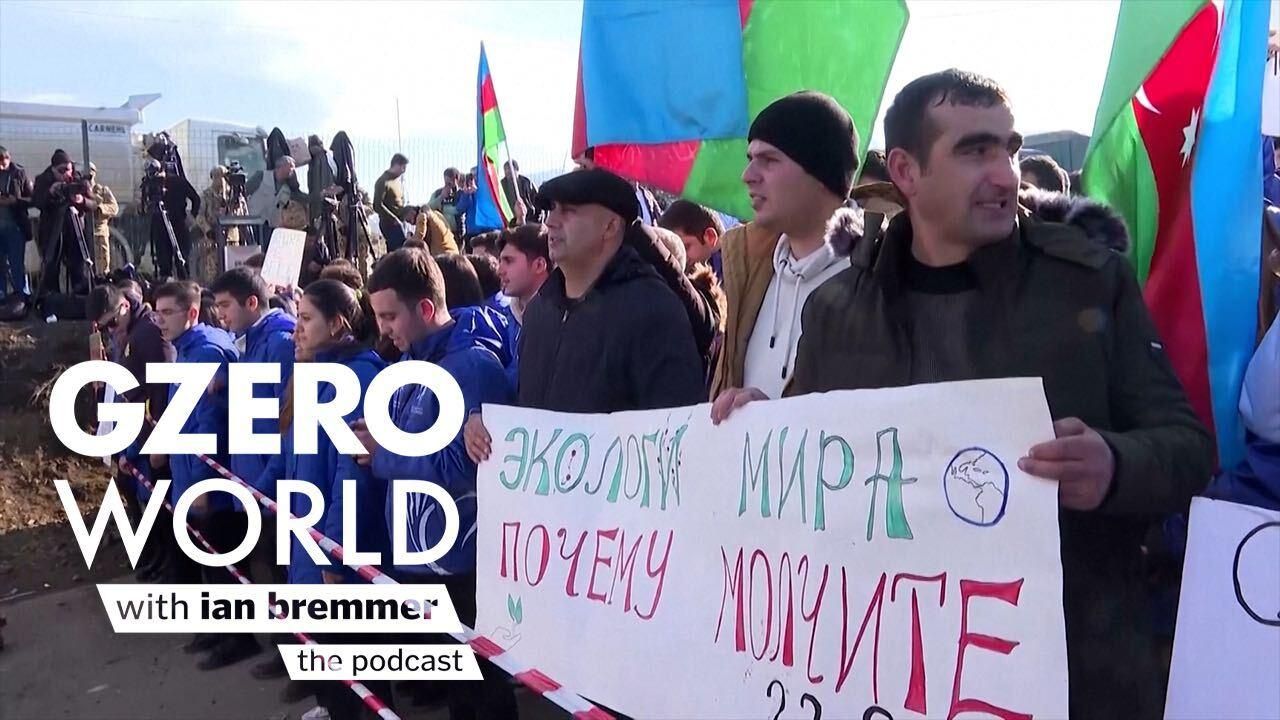GZERO World with Ian Bremmer Podcast
December 23, 2022
Listen: The people of the small Armenian enclave known as Nagorno-Karabakh have no way to get out. Recently, the long-simmering conflict in Nagorno-Karabakh has once again heated up with Armenia accusing Azerbaijan of blocking the only road that connects the disputed region with Armenia. The Azeris deny this and blame Russian peacekeepers. There are extremely heated opinions on both sides to this issue. Regardless of where the blame lies, the humanitarian risks to the region are growing. 30,000 kids cannot go to school as roads and gas have been cut off.
Food can't be brought in because the airport is closed. In a special edition of the GZERO World podcast, Ian Bremmer speaks to Ruben Vardanyan, who last month became state minister in charge of Nagorno-Karabakh, which the Armenians refer to as Artsakh.
Vardanyn discusses the blockade and reality on the ground, his region's hope for democracy, and the history of Artsakh's 30-year struggle to break free of Azerbaijan, whose government does not recognize the territory as independent. Before the fall of the Soviet Union, people living in the Nagorno-Karabakh Autonomous Oblast voted in a referendum to become free from the Azerbaijan Soviet Republic. Now, Russian peacemaking forces won't commit to staying very long in the region, and the European Union and the US have called for an end to the blockade. How will a resolution be reached, and what impact might this have on the Armenia/Azerbaijan peace agreement?
Subscribe to the GZERO World Podcast on Apple Podcasts, Spotify, Stitcher, or your preferred podcast platform, to receive new episodes as soon as they're published.From Your Site Articles
- What We’re Watching: Kenya’s new leader inaugurated, conflict flares between Armenia and Azerbaijan ›
- What We’re Watching: Bidding farewell to a queen, mass graves in Kharkiv, Pelosi in Armenia ›
- The Graphic Truth: How do Azerbaijan and Armenia stack up? ›
- What's happening in Nagorno-Karabakh? ›
- Armenia, Azerbaijan & the Nagorno-Karabakh crisis that needs attention - GZERO Media ›
- Armenia’s capital reels from the aftermath of Nagorno-Karabakh & Russia-Ukraine wars - GZERO Media ›
More For You
Ian Bremmer sits down with former US Ambassador to NATO Ivo Daalder to unpack a historic shift in the transatlantic alliance: Europe is preparing to defend itself without its American safety net.
Most Popular
Think you know what's going on around the world? Here's your chance to prove it.
U.S President Donald Trump, U.S. Vice President JD Vance, and U.S. Secretary of State Marco Rubio pose for a family photo with other representatives participating in the inaugural Board of Peace meeting, at the U.S. Institute of Peace in Washington, D.C., U.S., February 19, 2026.
REUTERS/Kevin Lamarque
Argentina, Armenia, Belarus, Egypt, Indonesia, Jordan, Pakistan, Paraguay, Vietnam – to name only a few.
A poster featuring Andrew Mountbatten-Windsor, formerly known as Prince Andrew, is installed on a sign leading to the parking area of the Sandringham Estate in Wolferton, as pressure builds on him to give evidence after the U.S. Justice Department released more records tied to the late financier and convicted sex offender Jeffrey Epstein, in Norfolk, Britain, February 5, 2026.
REUTERS/Isabel Infantes
British police arrested former Prince Andrew Mountbatten-Windsor today over allegations that in 2010, when he was a UK trade envoy, he shared confidential government documents with convicted sex offender Jeffrey Epstein.
© 2025 GZERO Media. All Rights Reserved | A Eurasia Group media company.
